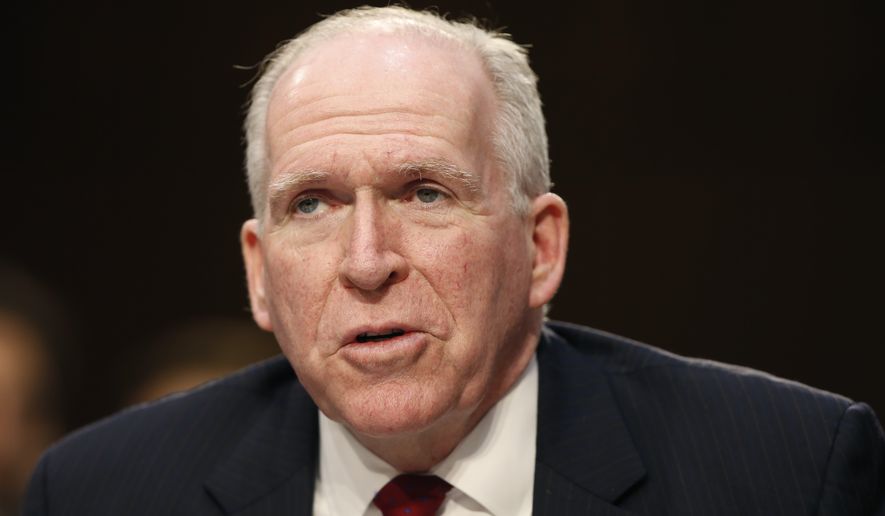The Obama administration dispatched CIA Director John O. Brennan to Bosnia and Herzegovina for a series of counterterrorism meetings Friday amid ongoing concern among intelligence officials that the Islamic State terror group aims to open a front in southeastern Europe.
Mr. Brennan arrived in Sarajevo on an unannounced visit from Saudi Arabia, where he held meetings this week with senior officials from six Arab nations on the sidelines of President Obama’s own trip to Riyadh.
The Associated Press reported that the head of Bosnia and Herzegovina’s anti-terrorism group, Goran Salihovic, told reporters Friday that Mr. Brennan’s visit was a “great honor” and that Bosnian officials would brief the CIA chief on their counterterrorism activities.
Mr. Brennan’s visit comes roughly four months after Bosnian authorities engaged in an aggressive sweep that arrested at least 11 people suspected of ties to the Islamic State, the Syria- and Iraq-headquartered terrorist group known as ISIS and ISIL.
While ISIS has claimed responsibility for last month’s suicide bombing attacks on Brussels, as well as those that ripped through Paris last November, the Bosnian arrests underscored growing concern among U.S. and European officials that the terror group may see the Balkans as a major target opportunity.
Late last year, a high-level Balkan diplomatic official told The Washington Times of a growing body of intelligence that ISIS may be setting its eye on infiltrating and destabilizing the region as part of extremist group’s push to expand its beyond its Middle East and North African bases.
The official, who spoke only on the condition of anonymity, said intelligence officials in Croatia had identified a possible extremist leader who was setting up in Kosovo and Bosnia and Herzegovina, both of which have sizable Muslim populations. The purported leader was also said to be organizing fighters who returned to the Balkans after traveling to join ISIS or al Qaeda’s al-Nusra Front in Syria.
The Combating Terrorism Center at West Point has estimated that as many as 600 men have joined Islamic State fighters from the Balkans since 2012. The Congressional Research Service has said some 330 have come from Bosnia and Herzegovina, 100 to 150 from Kosovo, 90 from Albania, 50 to 70 from Serbia and about a dozen from Macedonia.
Several Balkan nations raised their internal security levels last summer after the release of an Islamic State propaganda video on the Internet that showcased numerous Balkan fighters in Syria and threatened the spread of jihad to southeastern Europe.
The June 2015 video heightened concerns in Bosnia. While roughly 40 percent of the nation’s 3.8 million people are Muslim, the society is notoriously secular and tolerance for extremism is very low.
Bosnian authorities have been particularly vigilant with regard to a small number of Bosnian Muslims, known as Bosniaks, who embraced hard-line Salafism under the influence of Islamic foreign fighters who came to the nation during its 1992-95 war to help Muslims fight against Orthodox Christian Serbs and Catholic Croats.
The AP report Friday said the Bosnian government’s anti-terrorism group is made up of the heads of several agencies, including police, the prosecution office and border police. The report cited the group as saying its efforts to stop Bosnians from going to Syria have recently reduced the number of fighters leaving for the Middle East.
The group said 124 Bosnians are currently fighting in foreign wars — four in Ukraine and the others in Syria and Iraq for ISIS. It also said many of the Bosnians currently in Syria and Iraq want to return home and are negotiating with the government on how to do that. The fighters know they would face jail terms in Bosnia, but if they cooperate, they will get milder sentences, the group said.
The AP said Bosnian law foresees a jail term of up to 10 years for those who recruit, finance or personally participate in foreign wars, and quoted Mr. Salihovic on Friday as saying some 70 people have so far been processed by the nation as suspects in some form of terrorist activity.
• Guy Taylor can be reached at gtaylor@washingtontimes.com.




Please read our comment policy before commenting.